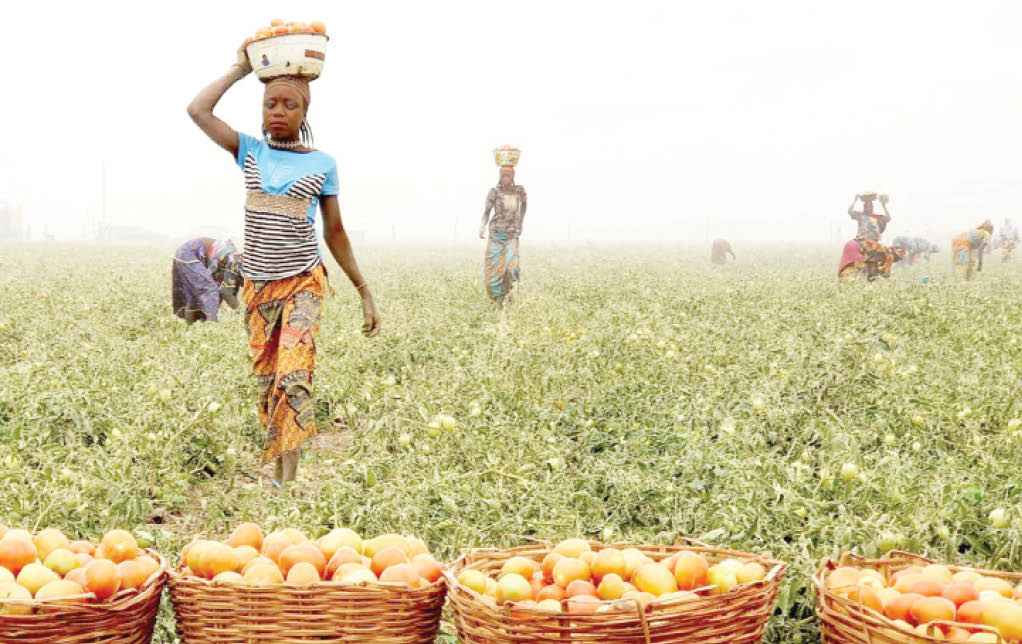Olam-Caraway’s first commercial tomato harvest records 40 tons per hectare
The Kuda Gangara Integrated Tomato Farm in Jigawa State has said its first successful commercial harvest at 40 metric tons per hectare is 25 percent above the projected tonnage. The Integrated Tomato Farm is a venture of Caraway (an Olam group company) with investment in the whole value chain worth over $20 million across the […]

Olam-caraway tomato farm
The Kuda Gangara Integrated Tomato Farm in Jigawa State has said its first successful commercial harvest at 40 metric tons per hectare is 25 percent above the projected tonnage.
The Integrated Tomato Farm is a venture of Caraway (an Olam group company) with investment in the whole value chain worth over $20 million across the commercial farming & outgrowers programme, crushing and the plants for processing and packaging.
The farm, which sits on a 500-hectare expanse of land, cultivates tomatoes in 100 hectares and yields from the first commercial harvest have exceeded the initial projection of 30 tons per hectare. The yield is also more than four times the average yield of local farmers in Nigeria.
About 2,000 farmers are currently part of the outgrowers’ scheme and when the complete 500-hectare is cultivated, total tomato output is expected to hit 15,000 tons from the commercial farm alone.
The farm, also in a statement, said the project was part of the backward integration drive of Olam-Caraway in strengthening local sourcing of raw materials for the company’s tomato paste factory in Lagos.
Caraway requires 18,000 tons of concentrate per annum and with the current backward integration efforts, will be able to reduce the shortfall in sourcing inputs. Presently, Caraway has a capacity to produce 44,000 tons of different products, the statement added.
The Head of Farming Initiatives, Olam, Mr Reji George, said the investment is driven to complement the thrust and direction of moving agriculture into a self-reliant and sustainable model by the Federal Government of Nigeria, ensuring enough and quality food to the population, as well as environmental sustainability.
“Besides, we are a leading entity in the Tomato supply chain by having a major share of the market and being present in this product over many years,” Reji further says. “Using significant volumes of tomatoes for our products, the backward integration helps us to achieve self-sufficiency, develop local farmers and provide increased employment opportunities to the local population.”
The current year’s crushing is expected to yield about 2000 MT of concentrates for further value addition and packing at the Caraway plant in Lagos. Caraway (an Olam Group Company) has partnered with a local crushing facility in Katsina State as part of the local value chain in this backward integration process.
Premender Sethi, Business Head, Packaged Food Business, Caraway (Olam Group), says this stride in achieving a local supply chain for raw materials, represents “a complete end-to-end supply chain solution for domestic markets – right from growing to crushing to processing to packaging for the domestic markets (from naturally grown high quality fresh tomatoes).”
Director General, Jigawa State Investment Promotion Agency, Ms Furera Isma Jumare, said the Caraway tomato project would showcase Jigawa State as one of the largest tomato-producing states in the country.
For her, expectations in terms of the Caraway project’s contribution to the state are both in terms of direct and indirect employment for citizens as well as skills transfer. Also, it would contribute to the IGR of the state and hopefully in the long term, reduce the cost of certain commodities such as tomatoes.
